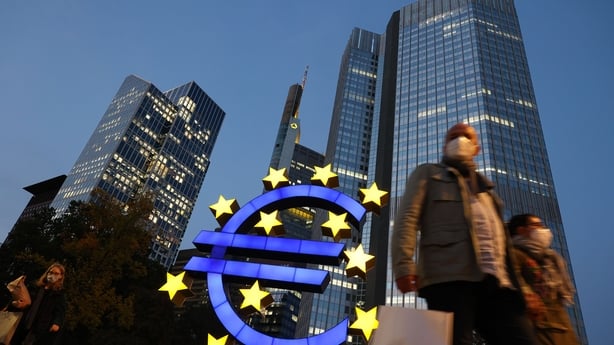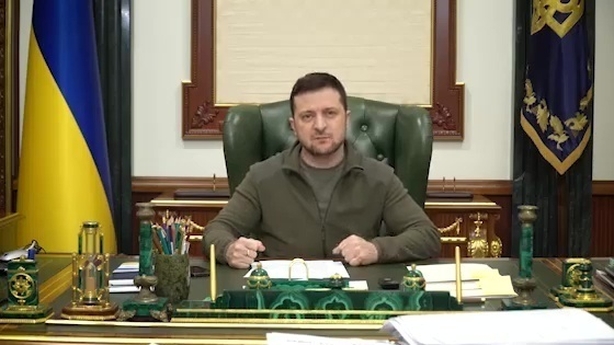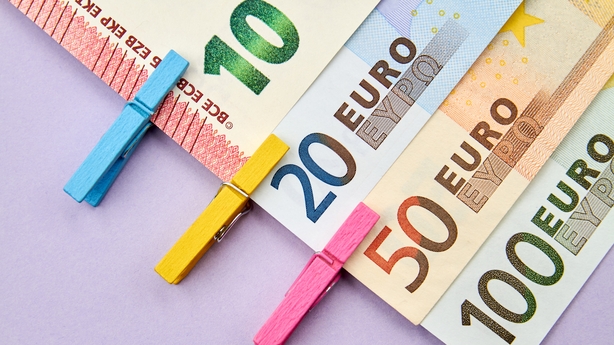The European Central Bank plans to end asset purchases in the third quarter, it said today, accelerating its exit from extraordinary stimulus in a surprise move.
The move comes as soaring inflation outweighs concerns about Russia's shock invasion of Ukraine.
With price growth in the euro zone at a record high even before Moscow began its assault on Febuary 24, policymakers were already pushing for a quicker exit from its asset purchases, opening the way for an interest rate hike late this year.
Although the war has challenged this view, February's record inflation 5.8% rate and the prospect of an even higher reading in March raised pressure on the bank to act in line with its mandate of keeping price growth at 2%.
The move still comes as a surprise for investors.
They had expected the ECB to make as few commitments as possible, keeping its options open until there is more clarity about the war, the impact of sanctions and the future course of commodity prices.
The ECB today confirmed plans to wrap up its €1.85 trillion Pandemic Emergency Purchase Programme at the end of the month.
It also said that purchases under the older and stricter Asset Purchase Programme (APP) will be smaller than previously planned.
It now expects APP purchases to total €40 billion in April, €30 billion in May and €20 billion in June.
Previously it set purchases at €40 billion in the second quarter, €30 billion in the third quarter and €20 billion in the fourth quarter.
Buys in the third quarter will be "data-dependent" the ECB added.
"If the incoming data support the expectation that the medium-term inflation outlook will not weaken even after the end of our net asset purchases, the Governing Council will conclude net purchases under the APP in the third quarter, " the ECB said.
It added that any adjustments in interest rates will take place "some time" after the end of asset buys and they would be "gradual".
Attention now turns to ECB President Christine Lagarde's news conference this afternoon, in which she will also unveil fresh economic projections.

Even with the Ukraine conflict creating uncertainty and risking deep cuts to growth, economists had largely seen a removal of ECB stimulus at some point this year as unavoidable.
Inflation across the 19 countries that use the euro could be three times the ECB's 2% target this year and is likely to remain elevated next year, too.
A rebound in economic growth and the tightest labour market in decades should also be pushing the ECB to abandon its ultra-easy policy stance and end a nearly decade-long experiment with unconventional stimulus.
Economists polled by Reuters expect the bond purchases to end in the third quarter and the bank is seen waiting until the last months of this year for its first interest rate rise in over a decade.
Money markets price in a 30 basis point increase to the ECB's deposit rate by December, which would take it to -0.2%.
The ECB has kept its rate on deposits below zero, effectively charging banks to park their idle cash, since 2014 to fight what was then sluggish inflation in the euro zone.
But the war in Ukraine, on the euro zone's eastern border, could fundamentally change this outlook.

Unprecedented sanctions slapped by Western countries on Russia and soaring commodity prices will all raise uncertainty, dampen growth, and sap households' purchasing power.
Some policymakers even argue that high commodity price are in fact deflationary in the medium term, because high fuel bills will limit households' ability to spend on other products and services.
This is why the ECB's inflation projection for 2024 is unlikely to be wildly different from the 1.8% it predicted three months ago.
The war is however likely to set in motion economic forces that could boost prices further out.
Increased defence spending, as outlined by several euro zone members, and a quicker green transition to wean the bloc off Russian gas are both likely to boost government spending and inflation.
These may also be backed by joint European Union debt issuance, and the bloc would be likely to look to the ECB to keep its cost of borrowing down.
It is next to impossible to quantify the inflation costs of these long term decisions, however, so ECB projections will not reflect them, even if policymakers are likely to raise them in the debate.
With today's decision, the ECB's benchmark deposit rate remains at -0.5% while the main rate was held at zero.
ECB raises inflation forecasts, cuts growth outlook amid Ukraine conflict
The European Central Bank has today raised its inflation projections but cut its growth outlook as the conflict in Ukraine is likely to keep commodity prices high, sapping households' purchasing power and firms' ability to invest.
The ECB now sees inflation at more than twice its 2% target this year, with price growth holding above its objective next year too, ECB President Christine Lagarde told a news conference.

Euro zone inflation is seen averaging 5.1% this year, above the 3.2% predicted in December while in 2023, it is seen at 2.1%, above a previous forecast of 1.8%.
Sporting a badge in the Ukraine colours at today's ECB press conference, President Lagarde said the Russian invasion of Ukraine "is a watershed for Europe."
The Russia-Ukraine war "will have a material impact on economic activity and inflation through higher energy and commodity prices, the disruption of international commerce and weaker confidence," Lagarde warned.
"The extent of these effects will depend on how the conflict evolves, on the impact of current sanctions, and on possible further measures," she added.
But Ms Lagarde said the ECB Governing Council "sees it as increasingly likely that inflation will stabilise at its 2% target over the medium term".
As inflation exceeded the target in 2021, the projections suggest at least three years of overshoots, a reversal from the previous decade, when the bank struggled to rekindle anaemic price growth.
The ECB's projections have proved unreliable over the past year and policymakers have expressed doubts about the accuracy of its models as they failed to predict the spike in prices even before Russia's invasion of Ukraine began on February 24.
Sky-high commodity prices will be a drag on growth, however, holding back an economy which has barely recovered from a deep, pandemic-induced recession.
The ECB targets inflation at 2%.
Ms Lagarde also said today that the European Central Bank has no intention of raising interest rates until some time after it has ended its bond buying at the end of the third quarter.
"Any adjustment to the key ECB interest rates will take place some time after the end of our net purchases under the APP (Asset Purchase Programme) and will be gradual," Lagarde told today's news conference.
"The path for the key ECB interest rates continues to be determined by the Governing Council's forward guidance and by its strategic commitment to stabilise inflation at 2% over the medium term."
Investors have scaled back their bets on rate hikes since Russia began its invasion of Ukraine on February 24. The conflict on the euro zone's eastern border is expected to slow growth and make the ECB more cautious about tightening its policy.
"The Governing Council expects the key ECB rates to remain at their present level until it sees inflation reaching 2% well ahead of the end of its projection horizon - and durably for the rest of the projection horizon," Lagarde said.
The ECB president had effectively opened the door to rate hikes at a February 2 news conference by refusing to repeat her long-held view that such a move was "very unlikely" this year.
The ECB pushed its deposit rate below zero in 2014, one of several aggressive measures taken to revive what was then sluggish price growth in the 19-country euro zone.

